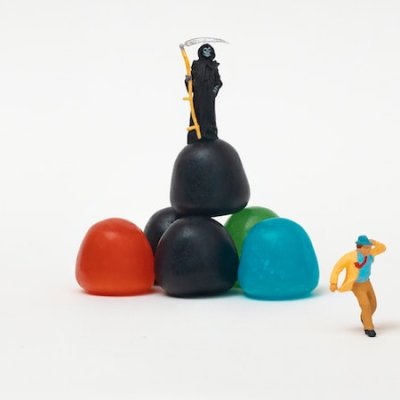junk
junk(
juhngk
)A noun is a word referring to a person, animal, place, thing, feeling, or idea (e.g., man, dog, house).
(f) means that a noun is feminine. Spanish nouns have a gender, which is either feminine (like la mujer or la luna) or masculine (like el hombre or el sol).
Do you think anyone's going to buy all this junk at the garage sale?¿Crees que alguien vaya a comprar toda esta chatarra en la venta de garaje?
b. la porquería (F)
(f) means that a noun is feminine. Spanish nouns have a gender, which is either feminine (like la mujer or la luna) or masculine (like el hombre or el sol).
What's this junk doing on the floor? - It's not junk; it's the cat's toys.¿Qué hacen estas porquerías en el suelo? - No son porquerías, son los juguetes del gato.
d. los cachivaches (M)
(m) means that a noun is masculine. Spanish nouns have a gender, which is either feminine (like la mujer or la luna) or masculine (like el hombre or el sol).
I'm not sure if even a pawn shop will buy this junk.No sé si siquiera una casa de empeños comprará estos cachivaches.
e. los trastos viejos (M)
(m) means that a noun is masculine. Spanish nouns have a gender, which is either feminine (like la mujer or la luna) or masculine (like el hombre or el sol).
We should put all this junk in boxes and store it in the lumber room.Deberíamos poner todos estos trastos viejos en cajas y guardarlos en el trastero.
2. (culinary)
a. la comida chatarra (F)
(f) means that a noun is feminine. Spanish nouns have a gender, which is either feminine (like la mujer or la luna) or masculine (like el hombre or el sol).
Eating junk all the time will eventually make you sick.Comer comida chatarra todo el tiempo eventualmente va a hacer que te enfermes.
b. la porquería (F)
(f) means that a noun is feminine. Spanish nouns have a gender, which is either feminine (like la mujer or la luna) or masculine (like el hombre or el sol).
We watched movies and ate junk the whole weekend.Vimos películas y comimos porquerías todo el fin de semana.
3. (boat)
4. (slang) (heroin)
A very informal word or phrase used by a particular group or community as a substitute for standard language (e.g., joint, john).
a. el caballo (M) (slang)
(m) means that a noun is masculine. Spanish nouns have a gender, which is either feminine (like la mujer or la luna) or masculine (like el hombre or el sol).
A very informal word or phrase used by a particular group or community as a substitute for standard language (e.g., joint, john).
They got over their addiction to junk five years ago.Superaron su adicción al caballo hace cinco años.
5. (slang) (male genitalia)
A very informal word or phrase used by a particular group or community as a substitute for standard language (e.g., joint, john).
a. el paquete (M) (colloquial)
(m) means that a noun is masculine. Spanish nouns have a gender, which is either feminine (like la mujer or la luna) or masculine (like el hombre or el sol).
A word or phrase that is commonly used in conversational speech (e.g., skinny, grandma).
The exhibitionist stood in front of me with his junk hanging out for all to see.El exhibicionista se paró en frente de mí enseñando su paquete para que todos lo vieran.
A transitive verb is a verb that requires a direct object (e.g., I bought a book.).
6. (colloquial) (to throw away)
A word or phrase that is commonly used in conversational speech (e.g., skinny, grandma).
b. tirar a la basura
Those clothes are as good as new; we should donate them instead of junk them.Esa ropa está como nueva; deberíamos donarla en lugar de tirarla a la basura.
c. desechar
If the pen has no ink, junk it and buy a new one.Si la pluma no tiene tinta, deséchala y compra una nueva.
Examples
Machine Translators
Translate are junking using machine translators
Conjugations
Other Dictionaries
Explore the meaning of junk in our family of products.
Random Word
Roll the dice and learn a new word now!
Want to Learn Spanish?
Spanish learning for everyone. For free.




















